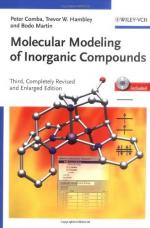|
This section contains 239 words (approx. 1 page at 300 words per page) |
Inorganic Compounds
Water is the most important inorganic compound. All living organisms require water to survive because chemical reactions occur in water solutions. Water is a very good solvent, the universal solvent, and dissolves many types of substances, such as various salts. Without water, the cellular reactions can't take place, so then it dies.
Salts are formed between a base and an acid. So without bases and acids, salts couldn't be formed. Zwitterions are salts that contain an anionic and cationic center in the same molecule. Examples of zwitterions are the amino acids, many metabolites, peptides, and proteins.
An acid is a usually a water-soluble, sour-tasting chemical compound. Acids are often dissolved in water to increase the pH. An acid reacts with a base in a neutralization reaction to form a salt. Some examples of strong acids are hydrobromic acid, nitric acid, sulfuric acid, hydrochloric acid, and chloric acid.
A base is a chemical compound that either donates hydroxide ions or absorbs them when dissolved in water, another inorganic compound. Bases keep a living organism's pH in check - not letting it get too high. Bases react with acids to form salts.
|
This section contains 239 words (approx. 1 page at 300 words per page) |


